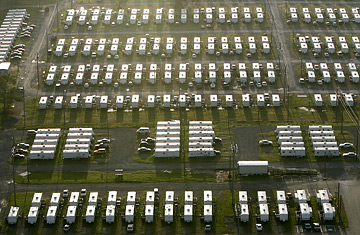
FEMA trailers in New Orleans
The bloody noses started almost immediately. Paul Stewart, a former police officer and first lieutenant in the U.S. Army, completely lost his home when Hurricane Katrina made landfall in Bay St. Louis, Mississippi. That December, the Federal Emergency and Management Agency (FEMA) gave Stewart and his wife a trailer to live in. The first night they slept in it, she woke up with blood coming out of her nose. Then he started developing troubling respiratory symptoms — burning eyes, coughing, a constantly scratchy throat. One morning, they awoke to find CiCi, their pet cockatiel, half-dead. All the symptoms pointed to formaldehyde poisoning.
Before too long, it became clear that those symptoms also pointed to yet more evidence of FEMA incompetence in dealing with the aftermath of the devastating storm. In fact, if anyone thought that FEMA's reputation for its handling of Katrina couldn't get any worse, they only had to listen to Stewart and others testify at Thursday's hearing before the House Oversight and Government Reform Committee. Dozens of pages of internal FEMA e-mails released by the committee revealed the agency's deliberate ignorance of field staff who were concerned about formaldehyde gas being emitted in trailers housing displaced residents. The documents revealed an agency that seemed more concerned with preventing potential lawsuits than with the health of those living in their mobile homes. "Recently discovered documents make it appear FEMA's primary concerns were legal liability and public relations, not human health and safety," said Virginia Rep. Tom Davis, a Republican. FEMA administrator R. David Paulison, who received stern questioning from both sides of the aisle, admitted that, "in hindsight, we could have moved faster to address [concerns]."
Following Hurricanes Katrina and Rita, FEMA doled out over 120,000 mobile homes to residents of the Gulf Coast. Many of those trailers have walls and cabinets made up of particleboard, which contains formaldehyde that can sometimes emit gas in hot, humid weather such as that found in Louisiana and Mississippi. The effect on humans (especially children) range from "burning sensations in the eyes, nose, and throat; nausea; coughing; chest tightness; wheezing; skin rashes and allergic reactions." As early as March 2006, FEMA began to receive complaints about formaldehyde odors. After one trailer was tested, an April 2006 e-mail sent from a FEMA attorney to another staffer concluded, "The end result — well above OSHA (Occupational Safety and Health Administration) standards... Tester himself developed eye-watering symptoms of exposure." Yet, in response to complaints, FEMA's legal department advised that testing "would imply FEMA's ownership of the issue." Another read, "Do not initiate any testing until we give the OK... Should [tests] indicate some problem, the clock is running on our duty to respond to them."
Rep. Henry Waxman, a California Democrat and committee chair, referred to FEMA's attitude as "sickening" and further said, "The nearly 5,000 pages of documents we've reviewed expose an official policy of premeditated ignorance." He also criticized the testing standards that FEMA and the Environmental Protection Agency used before they eventually came to the incorrect conclusion, as Paulison stated in May 2007, that "the formaldehyde does not present a health hazard." Trailers were left with windows ajar, air conditioning on and all vents open for days before interior air levels were tested for the gas — conditions that did not nearly approximate actual living conditions. It was only almost a year and a half after the first complaint — and with the looming prospect of a congressional hearing — that FEMA decided to act. Just yesterday, the agency announced that it was teaming up with the Centers for Disease Control and Prevention to conduct testing of the air quality in its trailers.
The back-and-forth between Paulison and lawmakers was tense, with repeated interruptions as they hammered home his agency's repeated failures. After Paulison said that the chairman's criticism was unfair because hindsight has made the situation clearer, Rep. Waxman responded, "Your own staff told you at the time there was a problem. That's not hindsight. That's a lack of foresight." Yet, despite striking testimony by victims and his seeming acknowledgment that mistakes were made ("we're recognizing that we may have something larger than just some individual cases"), Paulison still maintained that formaldehyde might not be the problem. "There is an issue inside those trailers, but I'm not sure if it's formaldehyde, or mold, or what." At present, he said, FEMA has "documented just over 200 complaints of strange odors including formaldehyde." Only 58 trailers have been replaced.
